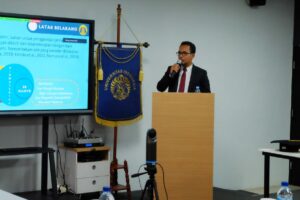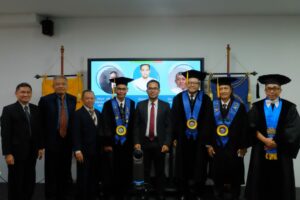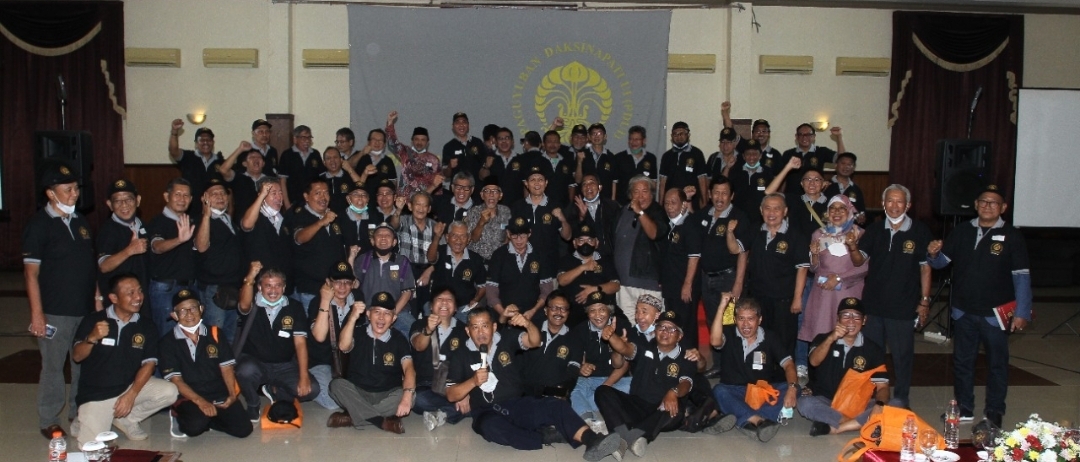
A DOCTORAL STUDENT OF FTUI DEVELOPED DOMESTIC METAL-BASED BIOMATERIALS FOR THE DEVELOPMENT OF BONE PLATE IMPLANTS
Applications of biomaterials play an essential role in medical treatment and have been widely used as substitutes for teeth, bones, stents, and other limbs. The Social Health Insurance Administration Body (BPJS Kesehatan) estimates that the use of biomaterials as a substitute for groin bones will reach 272,000 in 2030. In Indonesia, 90% of biomterials is still imported from abroad, so it is necessary to develop metal-based biomaterials domestically.
This need prompted a doctoral student from Mechanical Engineering Study Program, the Faculty of Engineering, Universitas Indonesia (FTUI), Muhammad Awwaludin, to conduct research elaborating biomaterial guidelines for the development of bone plate implants. This research was written in his dissertation entitled “Pengembangan Material Bone Plate Implan Tulang Berbasis Biotolerant zr Based Alloy Dan Uji Sifat Mekanik Beban Statik Dan Fatigue Biaksial“.
He said that in the last decade, metal-based biomaterials for biomedical and biological hard tissue substitutes have been studied and developed. Metallic materials have good biomechanical properties and are suitable for process sterilization in the biomaterials industry because they have excellent mechanical and corrosion properties. Alloys that have been broadly researched and developed as metal-based biomaterials are those based on titanium, ferrous, cobalt, magnesium, and zirconium because these alloys are bio-inert.
“In this study, I used zirconium-based alloys. The development is carried out through the production of non-mechanical characteristics, including microstructure, phase, corrosion resistance, and alloy toxicity values and mechanical properties, including hardness, axial-biaxial tensile strength, compression strength, shear strength, and axial-biaxial fatigue,” he said. In addition, the smelting process uses a vacuum arc melting furnace which is flowed with high-purity argon gas and uses metal raw materials with a purity above 99%.
Through the development of these zirconium alloys, Zr-6Mo-4Ti-3Y alloy can exhibit characteristics with low toxicity, high corrosion resistance, and better mechanical properties, so it is suitable for use as a bone plate. “From the research results of Dr. Muhammad Awwaluddin, it can be seen that the results on the development of zirconium-based biomaterials have better mechanical and non-mechanical characteristics and better biocompatibility for use as bone plate biomaterials. Thus, it is hoped that in the future this research can be carried out in-depth so that later it can be used as a reference in making bone plate biomaterials in Indonesia,” said the Dean of FTUI, Prof. Dr. Heri Hermansyah, ST., M.Eng., IPU regarding this research.

Thanks to his research, Muhammad Awwaluddin earned his doctoral degree with a GPA of 3.88 and a Cum Laude predicate, on Thursday (05/01). He is the 99th Doctor who graduated from the Mechanical Engineering Department and the 493rd Doctorate at FTUI. The Doctoral Promotion Session was chaired by the Chairman of the Session, Prof. Dr. Ir. Yanuar, M.Eng., M.Sc., with Promoter Prof. Dr. Ir. Tresna Priyana Soemardi, SE, MSi, IPU ASEAN-Eng., and Co-Promoter, Dr. Djoko Hadi Prayitno, MSME., The Examiner Team consisted of Prof. Dr. Ir. R. Danardono A. Sumarsono, DEA, PE., Prof. Ir. Jamasri, Ph.D., IPU., ASEAN Eng., Jos Istiyanto, ST. MT. PhD., Dr. Ir. Gatot Prayogo, M. Eng., Dr. Sugeng Supriadi, ST. Ms. Eng.



